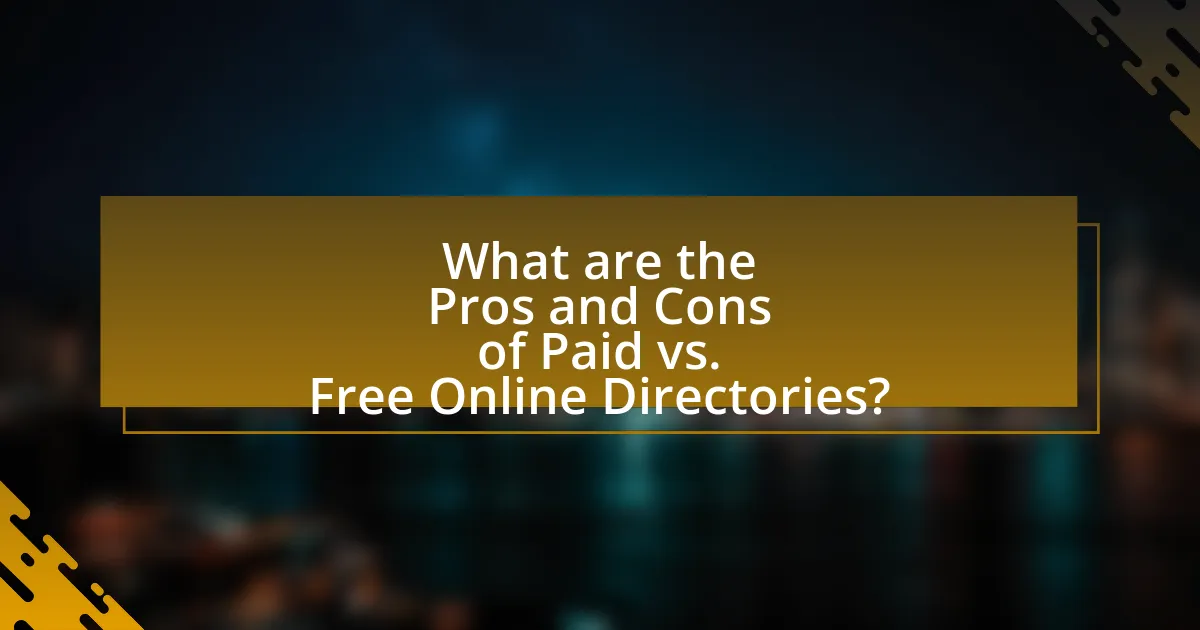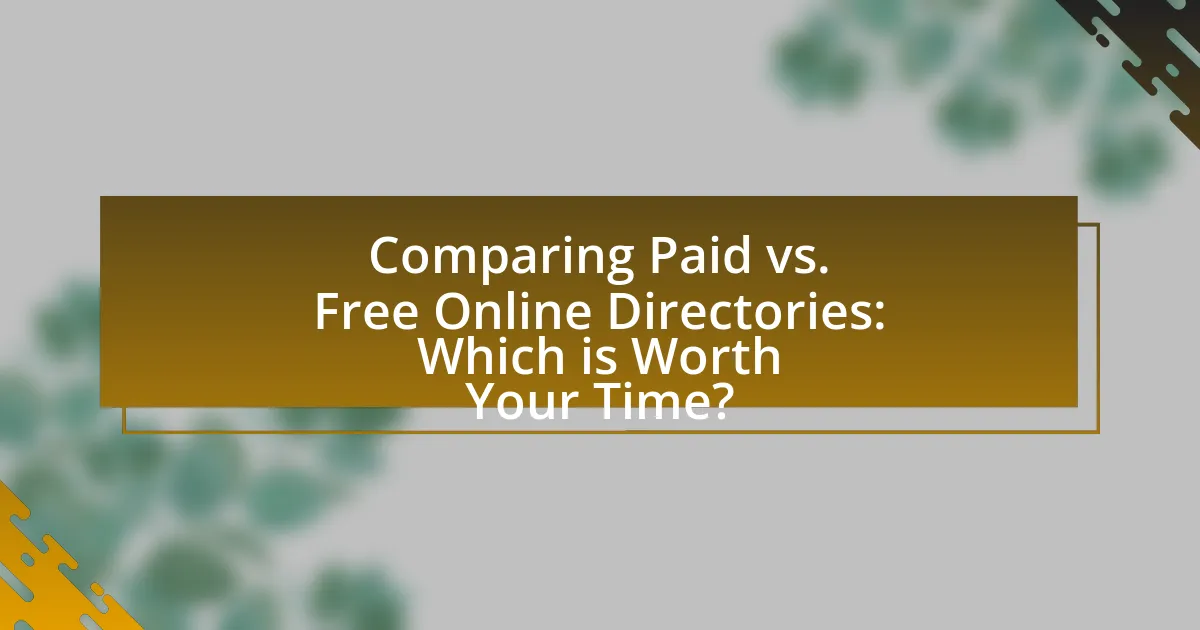The article compares paid and free online directories, highlighting their distinct features, costs, and operational mechanisms. Paid online directories require a fee for enhanced visibility and additional features, often resulting in better engagement and customer inquiries. In contrast, free online directories offer basic listings at no cost but may lack comprehensive information and support. The article also discusses the pros and cons of each type, including their impact on small businesses and startups, and provides guidance on how to choose the right directory based on specific needs and target audiences.

What are Paid and Free Online Directories?
Paid online directories are platforms that require users to pay a fee for listing their business or services, often providing enhanced visibility and additional features such as priority placement or promotional tools. Free online directories, on the other hand, allow users to list their businesses without any cost, typically offering basic listing options with limited visibility compared to paid directories. The distinction lies in the cost and the level of exposure and features provided, with paid directories generally yielding better results in terms of reach and engagement.
How do Paid Online Directories operate?
Paid online directories operate by charging businesses a fee to list their services or products, thereby providing enhanced visibility and access to potential customers. These directories typically offer various subscription plans that may include features such as premium listings, enhanced search visibility, and additional marketing tools. For instance, a study by the Local Search Association found that 70% of consumers use online directories to find local businesses, indicating the effectiveness of paid listings in attracting customer attention.
What features distinguish Paid Online Directories from Free ones?
Paid online directories typically offer enhanced features such as comprehensive listings, advanced search capabilities, and customer support, which distinguish them from free directories. Paid directories often provide verified and curated content, ensuring higher quality and accuracy of listings, while free directories may include user-generated content that lacks verification. Additionally, paid directories frequently offer promotional tools and analytics for businesses, enabling better visibility and tracking of performance, which are generally not available in free versions. These features contribute to a more reliable and effective user experience, making paid directories a preferred choice for businesses seeking to maximize their online presence.
What are the typical costs associated with Paid Online Directories?
Typical costs associated with paid online directories range from $50 to $500 annually, depending on the directory’s reach and features. For instance, niche directories may charge lower fees, while well-known platforms like Yelp or Angie’s List can demand higher rates due to their extensive user base and additional promotional tools. Furthermore, some directories offer tiered pricing models, where businesses can pay more for enhanced visibility or premium listings, which can exceed $1,000 per year. This pricing structure reflects the value of targeted exposure and potential customer engagement that paid directories provide.
What are Free Online Directories?
Free online directories are web-based platforms that list businesses, services, or resources without charging users for inclusion. These directories allow users to search for specific categories or types of services, facilitating easy access to information. For example, platforms like Yelp and Yellow Pages provide free listings for businesses, enabling them to reach potential customers without incurring costs. The prevalence of free online directories has increased significantly, with millions of listings available, making them a valuable resource for both consumers and businesses seeking visibility.
How do Free Online Directories generate revenue?
Free online directories generate revenue primarily through advertising, affiliate marketing, and premium listings. Advertising involves displaying paid ads from businesses, which can be targeted to specific audiences based on the directory’s user demographics. Affiliate marketing allows directories to earn commissions by promoting products or services linked to their listings. Premium listings offer businesses the option to pay for enhanced visibility or additional features, such as highlighted placements or detailed profiles. These revenue streams enable free online directories to sustain their operations while providing users with no-cost access to their services.
What limitations do Free Online Directories often have?
Free online directories often have limitations such as lack of comprehensive listings, outdated information, and minimal customer support. These directories typically do not verify the accuracy of the listings, leading to potential misinformation. Additionally, they may feature a limited number of categories or businesses, reducing their usefulness for users seeking specific services. The absence of advanced search features and filtering options further restricts user experience, making it difficult to find relevant information quickly.

What are the Pros and Cons of Paid vs. Free Online Directories?
Paid online directories offer advantages such as enhanced visibility, credibility, and often better customer support, while free online directories provide cost savings and accessibility but may lack features and reliability. Paid directories typically rank higher in search results due to their investment in marketing and SEO, which can lead to increased traffic and potential sales. In contrast, free directories may have limited reach and lower quality listings, which can affect user trust and engagement. For example, a study by the Digital Marketing Institute found that businesses listed in paid directories experienced a 30% increase in customer inquiries compared to those in free directories. However, free directories can be beneficial for startups or small businesses with tight budgets, allowing them to establish an online presence without financial commitment.
What advantages do Paid Online Directories offer?
Paid online directories offer enhanced visibility and credibility for businesses. By investing in a paid listing, companies can access a larger audience, as these directories often rank higher in search engine results compared to free directories. Additionally, paid directories typically provide more comprehensive features, such as detailed analytics, customer reviews, and promotional opportunities, which can lead to increased customer engagement. According to a study by the Local Search Association, businesses listed in paid directories experience a 30% higher click-through rate than those in free directories, demonstrating the tangible benefits of paid listings.
How do Paid Online Directories enhance visibility for businesses?
Paid online directories enhance visibility for businesses by providing a prominent platform for listings that often feature advanced search functionalities and targeted advertising options. These directories typically rank higher in search engine results, increasing the likelihood that potential customers will discover the business. For instance, a study by the Local Search Association found that 70% of consumers use online directories to find local businesses, indicating that paid listings can significantly improve exposure. Additionally, businesses that invest in paid directories often benefit from enhanced credibility and trust, as these platforms usually vet their listings, making them more appealing to consumers.
What additional services do Paid Online Directories provide?
Paid online directories provide additional services such as enhanced visibility, targeted advertising, and premium listings. These services allow businesses to stand out in search results, reach specific demographics, and gain access to analytics that track user engagement. For instance, premium listings often include features like photos, videos, and detailed descriptions, which can significantly improve click-through rates. Additionally, many paid directories offer customer support and promotional tools that help businesses optimize their presence on the platform, leading to increased traffic and potential sales.
What are the drawbacks of Paid Online Directories?
Paid online directories have several drawbacks, including high costs, limited visibility, and potential for low return on investment. The financial burden of subscription fees can deter small businesses from utilizing these services, especially when free alternatives exist. Additionally, many paid directories may not guarantee increased traffic or leads, as their effectiveness can vary significantly based on industry and competition. A study by the Local Search Association found that only 25% of users trust paid listings over organic results, indicating that paid directories may not always enhance credibility. Furthermore, some paid directories may have outdated or inaccurate listings, leading to frustration for users and businesses alike.
Are there risks associated with investing in Paid Online Directories?
Yes, there are risks associated with investing in Paid Online Directories. These risks include the potential for low return on investment, as many directories may not drive significant traffic or leads to businesses. Additionally, the credibility of the directory can be questionable; some may not have a strong reputation or may be poorly maintained, leading to wasted resources. According to a survey by the Local Search Association, 60% of businesses reported that they did not see a measurable return from paid directory listings, highlighting the financial risk involved.
How do costs impact small businesses when using Paid Online Directories?
Costs significantly impact small businesses when using paid online directories by creating a financial burden that can affect their overall profitability. Small businesses often operate on tight budgets, and the fees associated with these directories can divert funds from other critical areas such as marketing, inventory, or staffing. For instance, a survey by the Small Business Administration found that 30% of small businesses reported that high marketing costs, including directory listings, hindered their growth. Additionally, if the return on investment from these paid listings does not meet expectations, businesses may struggle to justify the expense, leading to potential financial strain.
What benefits do Free Online Directories provide?
Free online directories provide increased visibility and accessibility for businesses and services. These directories allow users to easily find and connect with local businesses without any cost, enhancing the chances of customer engagement. According to a study by the Local Search Association, 70% of consumers use online directories to find local businesses, demonstrating their effectiveness in driving traffic. Additionally, free online directories often have high domain authority, which can improve search engine rankings for listed businesses, further amplifying their online presence.
How can Free Online Directories be advantageous for startups?
Free online directories can significantly benefit startups by enhancing their visibility and improving search engine optimization (SEO). By listing in these directories, startups can reach a broader audience without incurring costs, which is crucial for budget-constrained new businesses. According to a study by BrightLocal, 46% of all searches on Google are seeking local information, indicating that being listed in free online directories can drive local traffic and potential customers to startups. Additionally, these directories often provide backlinks to the startup’s website, which can improve its search engine ranking, making it easier for potential customers to find the business online.
What are the potential downsides of using Free Online Directories?
The potential downsides of using free online directories include limited visibility, lower credibility, and the risk of outdated or inaccurate information. Free directories often have less stringent listing criteria, which can lead to a higher volume of irrelevant or low-quality listings, making it difficult for users to find reliable information. Additionally, businesses listed in free directories may not be perceived as trustworthy compared to those in paid directories, where listings typically undergo more rigorous vetting processes. A study by the Local Search Association found that 70% of consumers trust businesses listed in paid directories more than those in free ones, highlighting the credibility issue. Furthermore, free directories may not provide the same level of customer support or features, such as analytics, that paid options offer, limiting a business’s ability to track performance and optimize its online presence.

How to Choose Between Paid and Free Online Directories?
To choose between paid and free online directories, evaluate your specific needs and budget. Paid directories often provide enhanced visibility, targeted audience reach, and additional features such as analytics and customer support, which can justify their cost. In contrast, free directories may offer basic listing services without the same level of exposure or support. According to a 2022 survey by Clutch, 70% of businesses reported that paid listings resulted in higher quality leads compared to free listings, indicating that the investment can yield better returns. Therefore, assess the potential benefits against your marketing goals to make an informed decision.
What factors should you consider when selecting an Online Directory?
When selecting an online directory, consider factors such as the directory’s credibility, user base, search engine optimization (SEO) potential, and the specific niche it serves. Credibility is essential; directories with a strong reputation attract more users and provide better visibility for listings. A large and active user base increases the chances of engagement and leads. SEO potential is crucial, as directories that rank well in search engines can enhance the visibility of your listing. Finally, the niche of the directory should align with your target audience to ensure that your listing reaches the right people.
How does your business type influence the choice between Paid and Free Directories?
The type of business significantly influences the choice between paid and free directories. Service-oriented businesses, such as consultants or freelancers, often benefit from paid directories due to enhanced visibility and credibility, which can lead to higher conversion rates. In contrast, product-based businesses, especially those with a local focus, may find free directories sufficient for reaching their target audience, as they can leverage local search traffic without incurring costs. For instance, a study by the Local Search Association found that 70% of consumers use online directories to find local businesses, indicating that the directory type can impact customer acquisition strategies based on business nature.
What role does target audience play in this decision?
The target audience significantly influences the decision between paid and free online directories. Understanding the demographics, preferences, and behaviors of the target audience helps businesses determine which directory type aligns with their marketing goals. For instance, if the target audience consists of budget-conscious consumers, a free directory may be more effective, as it attracts users looking for cost-free options. Conversely, if the audience values premium services and is willing to pay for enhanced visibility, a paid directory could yield better results. Research indicates that 70% of consumers trust online reviews and directories, emphasizing the importance of selecting a platform that resonates with the audience’s expectations and needs.
What are some best practices for using Online Directories effectively?
To use online directories effectively, ensure accurate and complete business listings. Accurate listings enhance visibility and credibility, as 70% of consumers trust online reviews and listings that contain complete information. Regularly update your information to reflect changes in services or contact details, as outdated listings can lead to lost opportunities. Utilize keywords relevant to your business in your directory descriptions to improve searchability, as 93% of online experiences begin with a search engine. Engage with customer reviews by responding promptly, which can increase customer trust and engagement. Lastly, analyze directory performance metrics to understand which platforms yield the best results, allowing for strategic adjustments in your marketing efforts.
How can you optimize your listing in both Paid and Free Online Directories?
To optimize your listing in both paid and free online directories, ensure that your business information is complete, accurate, and consistent across all platforms. This includes using the same business name, address, and phone number (NAP) in every directory, which helps improve local SEO and builds trust with potential customers. Additionally, incorporate relevant keywords in your business description to enhance visibility in search results.
Utilizing high-quality images and encouraging customer reviews can further enhance your listing’s appeal and credibility. According to a study by BrightLocal, 87% of consumers read online reviews for local businesses, indicating that positive reviews can significantly impact consumer decisions. Regularly updating your listings with new information, promotions, or services also keeps your profile active and engaging, which can improve your ranking in both paid and free directories.
What common mistakes should you avoid when using Online Directories?
Common mistakes to avoid when using online directories include neglecting to verify the accuracy of your business information, failing to optimize your listings with relevant keywords, and not regularly updating your profile. Verifying accuracy is crucial because incorrect information can lead to lost customers; a study by BrightLocal found that 80% of consumers lose trust in local businesses if they see incorrect information. Optimizing listings with keywords enhances visibility, as search engines prioritize relevant content. Regular updates are essential to maintain engagement and reflect any changes in your business, as outdated information can deter potential clients.
